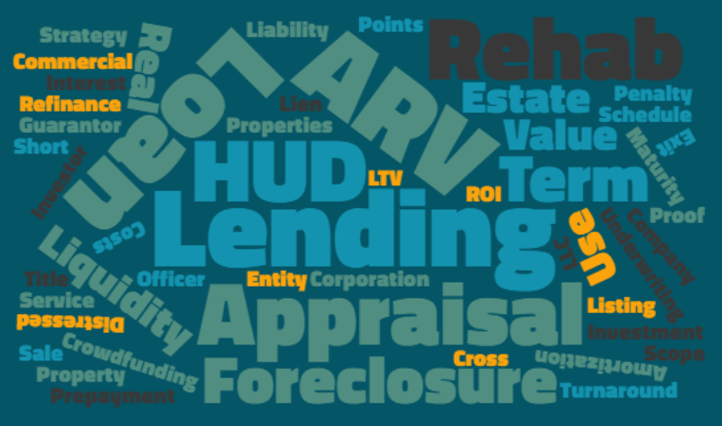Getting involved in real estate investing can present a potential investor with a whole new vocabulary that is rarely seen in everyday life. We want to make sure you’re completely comfortable with every part of the investing process, so we’ve compiled a list of terms that you can expect to see throughout your real estate investing career.
The Definitive Guide Real Estate Investing Terms
After Rehab Value (ARV): How much the house is expected to be worth after all of the stated renovations are completed.
Amortization: A fixed principal repayment schedule of a loan with principle being paid down over a specific period of time.
Appraisal: A professional assessment of how much a house is currently worth or going to be worth, after a renovation is completed.
Commercial Use: Property that is only used as a business – having no residential component.
Corporation: An entity in which individual owners are not directly responsible for any debt incurred by the company. In corporations, independent stockholders own parts of the company, but are not directly related to the actions of the company.
Cross Collateralize: A lending technique when an asset is used as collateral for two different loans.
Crowdfunding: A group of investors, who don’t necessarily know each other, buy a percentage interest in a loan through a single portal.
Default: Failure to abide by the terms of a loan, and such failure continues for more than 30 days.
Distressed Properties: Properties that are in poor condition that may also be in foreclosure; they are great candidates for fix and flip investments.
Draw Schedule: A payment plan for new construction or renovation projects. This schedule helps lenders determine when they are going to distribute funds to their borrower based on the value of the work completed.
Entity: Either an LLC, a corporation, a sole proprietorship, or a partnership; not an individual.
Escrow Account: An account run by a third party in a transaction between a lender and investor. The lender puts its money in an escrow account in anticipation of a future renovation. As the renovation proceeds, escrow funds are sent to the borrower.
Exit Strategy: How the borrower plans to payoff the loan, as well as turn a profit. Having a clear exit strategy is an important part of developing your overall plan for the project which will help determine the best kind of financing method for the deal.
Foreclosure: The process by which a lender legally takes control of a property because the borrower defaults on the loan.
Guarantor: A person who agrees to assume responsibility for any remaining owed amounts on a loan should there be any.
Hard Money Loan: A loan typically secured by a hard asset such as residential or commercial real estate. Such loans are usually for one to two years and have high interest rates relative to bank loans. Hard money lenders typically look more to asset value rather than at the credit characteristics of the potential borrower as the primary loan underwriting factor. Hard money lending is very useful to those who are in need of quick financing since these loans can be closed in as little as a few days if the paperwork is in order. Hard money loans have higher interest rates due to their higher risk and quick service.
[su_note note_color=”#f4f4f4″ text_color=”#777777″ radius=”1″]
 Related Post:
Related Post:
What Is Hard Money Lending:
Top 10 Hard Money Loan Questions
Read Post[/su_note]
Holding Costs: Costs attributed to owning an investment property for a period of time. This includes property taxes, house maintenance, insurance and utilities.
HUD-1: A form created and distributed by the transaction’s settlement agent at the settlement of a real estate purchase that lists all of the transaction cash flows between property buyer, seller and lender.
Interest Rate: The amount expressed as a percentage that a borrower has agreed to pay a lender as the price of borrowing a sum of money. If the interest rate is 10% for one year on a $100,000 loan, the borrower will pay $10,000 for the use of money for one year. ($100,000 * 0.1 = 10,000).
Lien: A legal claim on an asset filed with the county clerk. A lien is typically filed by a lender as evidence of its claim upon an asset until such time as the associated loan is repaid.
Liquidity: A measure of the speed that an asset can be sold.
LLC (Limited Liability Company): An entity where individual members are protected from financial liability in excess of the amount a member has invested.
Loan Officer: Loan officers help borrowers work out their loan agreement and recommend the best plan of action for completing the loan. See our loan officers here.
Loan Points: An origination fee. One point is equal to one percent of the principal loan amount. If the loan is $100,000 with 2 points, then the borrower will pay $2,000 in origination fees.
Loan Term Summary (LTS): Document that helps avoid any hidden costs. The LTS outlines all of the conditions of the loan including amounts, penalties, and deadlines.
Loan to Value (LTV): This is a ratio derived from the formula (Loan Amount) / (Appraisal Value).
Maturity (Loan Term): Maturity date refers to the final payment date of a loan or other financial instrument, at which point the principal (and all remaining interest) is due to be paid.
Mixed Use: When a building is used for more than one purpose (Residential and Commercial).
MLS (Multiple Listing Service): A database where real estate for sale is listed for a given area or region. Brokers from this area work together to compile this list.
Prepayment Penalty: A penalty assessed for paying off the loan before the agreed maturity date. Asset Based Lending does not charge prepayment penalties.
Private Lending: An individual or group of individuals that lends to real estate investors. They usually lend their own funds.
Proof of Funds: A document provided by a lender that is intended to document that a borrower has the available funds to complete a transaction.
Property Flipping: Buying a property and then renovating the property in order to increase the value of the asset such that it may be sold at a profit.
Real Estate Broker: Person or firm that helps their clients buy and sell their real estate for a fee.
Real Estate Investor: Someone who purchases properties with the intention of making a profit, either through holding for rental income or reselling it at a premium to cost.
Refinance: Replacing an existing loan with a new one. Typically, people refinance to get a lower interest rate on their loan and/or to leverage real estate value for cash.
REO (Real Estate Owned): A process where ownership of a property was transferred from an original owner to the owner’s lender through the foreclosure process.
Return on Investment (ROI): A measure used to calculate the efficiency of an investment. This is a percentage derived from the formula (Gain From Investment / Cost Of Investment).
Scope of Work: This is an outline of all the renovations scheduled to be completed before the house is sold, as well as their anticipated costs. The SOW also gives a timetable of when the service provider expects each component of the rehab to be completed.
Short Sale: This occurs when a seller is selling their house for less than they owe on their mortgage. In order for this to happen, the bank or lending company needs to approve of the sale at the lower price. Short sales are a popular way to find investment properties because of their lower purchase costs.
Title: Proof of legal ownership of a real estate asset.
Turnaround Time: The amount of time it takes from when the investment property is purchased to when it is sold.
Underwriting: The assessment of risk and reward for a potential investment. Underwriters determine the credibility of the potential investor and determine if their investment is going to be able to make enough money to be profitable for all parties involved. Hard money underwriters do not look at the same criteria as traditional mortgage underwriters. For example, they are more concerned with the profitability of the deal than the credit history of the borrower.
Now that you have the vocabulary of a seasoned real estate veteran, it’s time to go out a make a deal. Asset Based Lending would love to hear from you to discuss funding your next project. From newbie to professional flipper, we work with investors of all experience levels!
Give us a call at (201) 942-9089 or email us at info@abl1.net for more information. If you’d like to accelerate the process, pre-qualify today.
Pre-Qualify Today







The areas listed in CT are towns or counties? I am looking to invest in Hartford County.
Hi Lisa,
We do lend in Hartford County. Please feel free to call us at 201-942-9089 for more information.
Thanks for pointing out that hard money lenders are more interested in the asset value of potential borrowers than their credit. My husband and I are interested in getting a hard money loan. Our credit scores are decent, but we do have valuable assets; I’m glad to hear we should be able to get a hard money loan!
Thank you for explaining that a hard money loan is a quicker and higher risk loan. My wife has been talking about getting a hard money loan for her start-up, but I had no idea what she was talking about. I should talk to her about the higher interest rate.
Hey!
Thanks for sharing this valuable information with us.
Thanks a lot for sharing. You have done a brilliant job. Your article is truly relevant to my study at this moment, and I am really happy I discovered your website.